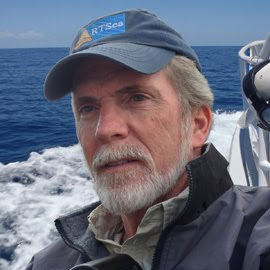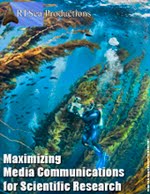 When we talk about preserving our marine resources for future generations, we need to ensure that younger people are engaged both actively and emotionally in ocean conservation. Lindsey Wright, who is passionate about education technology, supplies a guest post that reminds us all of how and when children can best learn to appreciate animals. Understanding their development cycle is key. And in the end, the result we hope for is that, as Jacques Cousteau once said, "People protect what they love."
When we talk about preserving our marine resources for future generations, we need to ensure that younger people are engaged both actively and emotionally in ocean conservation. Lindsey Wright, who is passionate about education technology, supplies a guest post that reminds us all of how and when children can best learn to appreciate animals. Understanding their development cycle is key. And in the end, the result we hope for is that, as Jacques Cousteau once said, "People protect what they love." Better Conservation Education
The best way to end up with adults that care about the future of the planet and the species that inhabit it is to start teaching basic ecological principles when children are young and eager to learn new things. Many children never fully understand the concepts of biodiversity and ecosystems until they start taking biology classes in high school or “go to” college at an online school. By that age, they may be too occupied with other things to care about the implications of the loss of biodiversity on our planet. However, it is never too early to start exposing children to information that engages and interests them. Young children may not be able to grasp complex ecological concepts early in life, but a foundation can be built that makes them interested in learning more about science.
The first step in engaging a child in conservation education is to teach them about animals. This is not difficult, because young children are naturally fascinated with animals. Very young children may learn words like "cat," "dog" and "fish" at an early age. However it is common for children to generalize these terms incorrectly for a period of time. For example, a child may say "cat" when they see a rabbit. To an adult, this mistake does not make sense, but the young child is referring to any small, fuzzy mammal as a "cat." That is, the word is more general in their mind than it is for an adult, who has narrowed the word "cat" down to mean domesticated cats and maybe other members of the feline family. In this stage of cognitive development it is too early for the child to be interested in learning the names of animals that they will probably not encounter outside of zoos, but they may still enjoy seeing these animals and looking at pictures of them.
Thus when a child starts to learn the names of animals that are more uncommon, they will probably be very interested in learning about animals that most people do not know about, including endangered species and creatures that inhabit the deep oceans. Children of this age may enjoy going to zoos or aquariums, looking at Web sites with pictures of interesting animals, going on field trips to local conservation centers or reading books with pictures of animals. Teachers and parents work together in educating a child; if a child seems particularly interested in something, their interest shouldn't be ignored.
The World Wildlife Fund website is a good resource for looking at pictures of endangered species, learning their names and reading more information about them. If a child has the attention span for it, watching a visually-stimulating series of nature documentaries, such as "Planet Earth," "Life," or "Blue Planet" may fascinate them. These television series highlight different ecosystems, from the deepest parts of the oceans to the highest mountaintops on Earth, and feature many lesser-known species. There are other resources on television, in libraries and on the Internet. If a child knows about the vast number of unique species on planet Earth, they are more likely to care about what happens to them in the future. Many people simply do not know the extent of the environmental problem because they do not know the extent of the environment!
Eventually, the idea that there are even more species on planet Earth than we know about, and new species are discovered every day can be introduced to school-aged children. Another important concept is that ecosystems, or all of the living things and the environment in a certain area, are in balance, and it is possible for this balance to be disrupted by the actions of human beings. Species are going extinct due to overpopulation, habitat destruction, depletion of natural resources, overhunting and overfishing, pollution and agriculture.
A good way to teach children about extinction, of course, is by teaching them about dinosaurs and fossils. Extinction is not always cataclysmic, however; some ecologists consider the current ongoing loss of biodiversity to be the sixth major extinction in the history of the planet. It is important to teach children that not all species go extinct because of a natural disaster such as a meteor hitting the earth, but that species can and do go extinct silently. Some species that we don't even know about, such as those in the deep oceans, may go extinct before they are ever known to science. Not all types of creatures leave fossils, so there are many species, several that are much older than humans, that we will never know about.
To drive this point home, all that is needed is to do a quick image search for "deep sea creatures" in your Web browser. The oceans cover most of our planet, and we know very little about them. Scientists know more about the surface of the moon than we do the deepest parts of our oceans. As such, it's likely that the pictures that come up in the image search will seem alien, bizarre and even scary, with their odd body forms, large teeth and bioluminescence. If you have never seen these creatures before, you may very well forget which planet you live on. These species are all relatively newly discovered, and there are many more species that have never been seen by human eyes or photographed. This is just one ecosystem. Granted, it is devoid of sunlight and very hard to explore, but there are also many undiscovered species in every ecosystem on Earth.
The best way to get children involved in conservation in our oceans and other ecosystems is simply showing children why it's important to take care of our oceans. A person can not care about a cause that is not real to them. If your conception of planet Earth is a handful of cities, a suburb or a small town, you are unaware of how big planet Earth really is. If you are unaware that there is a problem, you are unaware of how small and vulnerable planet Earth really is.
About Lindsey Wright: Lindsey Wright is fascinated with the potential of emerging educational technologies, particularly the online school, to transform the landscape of learning. She writes about web-based learning, electronic and mobile learning, and the possible future of education.

















No comments:
Post a Comment